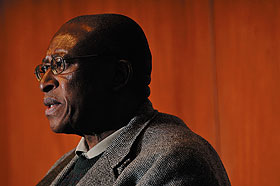  |
| HOME | THIS ISSUE | CALENDAR | PATENTS | BACK ISSUES | < BACK | NEXT > |
South African writer reflects on literature of reconciliationby Sherry Fisher - November 10, 2008 |
||||
| Few books have been written by South African novelists that were inspired by the Truth and Reconciliation Commission, according to playwright and author Zakes Mda. That, he says, may seem uncharacteristic, considering that writers often harvest their material from society. Mda, the 2008 Marsha Lilien Gladstein Visiting Professor in Human Rights, made his remarks during the Gladstein Distinguished Lecture on Human Rights in Konover Auditorium on Oct. 29. The lectureship is administered by the Human Rights Institute. The Truth and Reconciliation Commission (TRC) was established to deal with the human rights violations that occurred between 1960 and 1994 during the apartheid era in South Africa. The Commission sought to affirm the dignity of the victims of apartheid and make recommendations about their rehabilitation. It also granted amnesty to the perpetrators of those violations, provided that they confessed all they knew to the satisfaction of the commissioners. The process was intended to bring about reconciliation and promote the transition to democracy in South Africa. The TRC was an innovative alternative to the approach epitomized by the Nuremberg Trials and prosecutions of former Nazis after World War II, and has since been implemented in several other countries. “One would have imagined that as a major event in South African life, the TRC would have generated a considerable amount of imaginative fiction from us – black writers,” said Mda, a South African who currently teaches at Ohio University. Dearth of fiction “Throughout the years we all knew that these atrocities were happening because they were happening to us. The fiction that we produced during the days of apartheid was, in fact, about those human rights violations. The atrocities were a revelation only to our white compatriots, those who had bought into state propaganda that any talk of South African security forces — the very Afrikaners who had been grounded in Calvinistic Christian teachings — committing atrocities was nothing but Communist propaganda.” Publishers have played a significant role in the dearth of fiction surrounding the TRC, Mda said, noting that it’s difficult for new writers to publish books that are set during the apartheid era. “It has nothing to do with political censorship,” he said. “It’s a commercial decision. Publishers wrongly believe that stories about apartheid don’t sell. People don’t want to read about the past.” Dramatic representations
“Theater is highly subsidized by the state or private grants and foundations, and therefore commercial considerations are rarely the ultimate determining factor as to whether a work will be produced.” Mda said that unlike writers of fiction, playwrights have written about the TRC quite extensively. “The stage thrives on what is dramatic and visually appealing,” he said. “What could be more visually impactful than the images that were captured on live television of perpetrators, former apartheid security police, assuming the role of actors and demonstrating how they carried out the vilest acts of torture and murder? Here was the true spectacle: The spectacle of confession; the spectacle of violence; the spectacle of victims and their relatives moaning softly as evidence is presented, and then bursting out into searing screams before they faint …” Mda noted the ‘carnivalesque atmosphere’ among spectators gathered outside the school auditoriums and church halls where the TRC held its hearings. Some sang freedom songs or hymns, others danced. “The TRC played well into black South African expressive culture,” he said, “where there is a strong interrelationship of performance and reality.” Mda said in the play Ubu and the Truth Commission, the main question was how to resolve the conflicting interests of justice and punishment on the one hand, and forgiveness and reconciliation on the other. The production contributed to the debate at a time “when many black South Africans were beginning to question in whose interests really was all this talk of forgiveness and reconciliation,” he said. “What irked the most was that people who admitted to committing atrocities were granted amnesty and continued to derive benefits from those wrongs.” In Truth and Translation, a recent play about the TRC, the focus is on the victims and their perpetrators. “This one takes a different direction in that it focuses on the translators and interpreters who had to simultaneously repeat the words of both victim and perpetrator in all the country’s 11 official languages,” Mda said. “They had to tell both sides of the story using the first person pronoun ‘I’. The play shows how their personal lives were affected just by speaking those words, taking ownership of each heinous story.” |
| ADVANCE HOME UCONN HOME |

